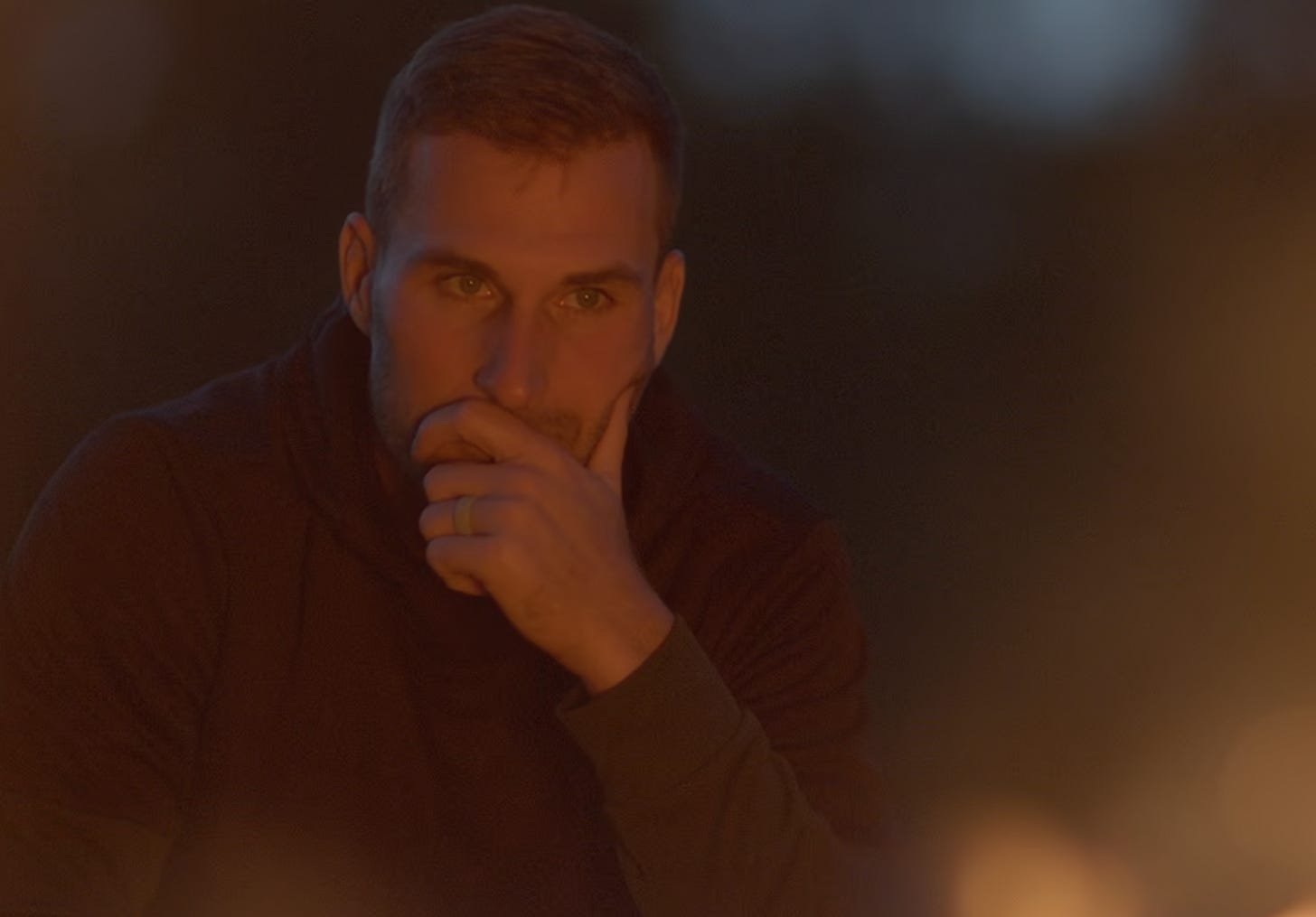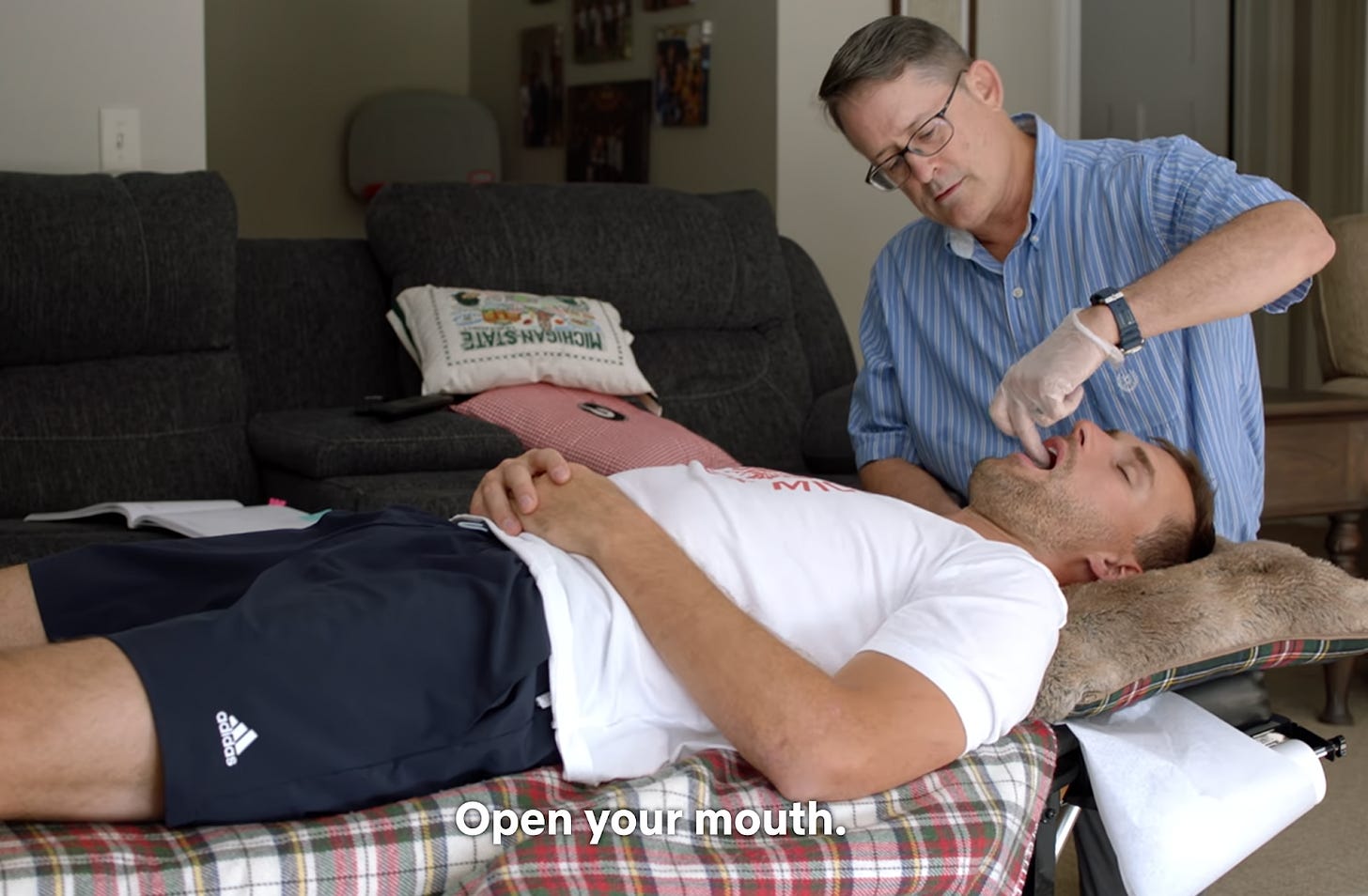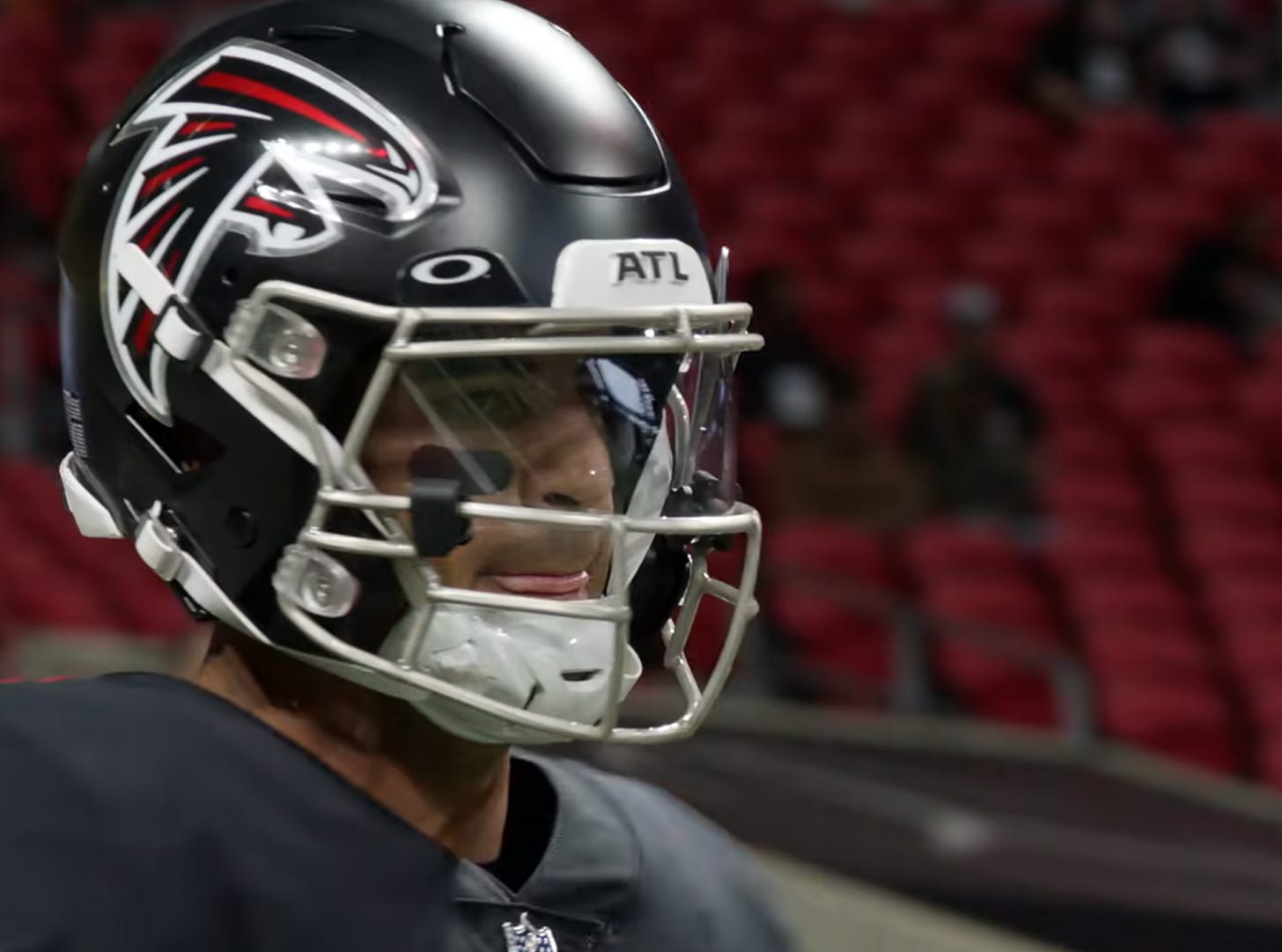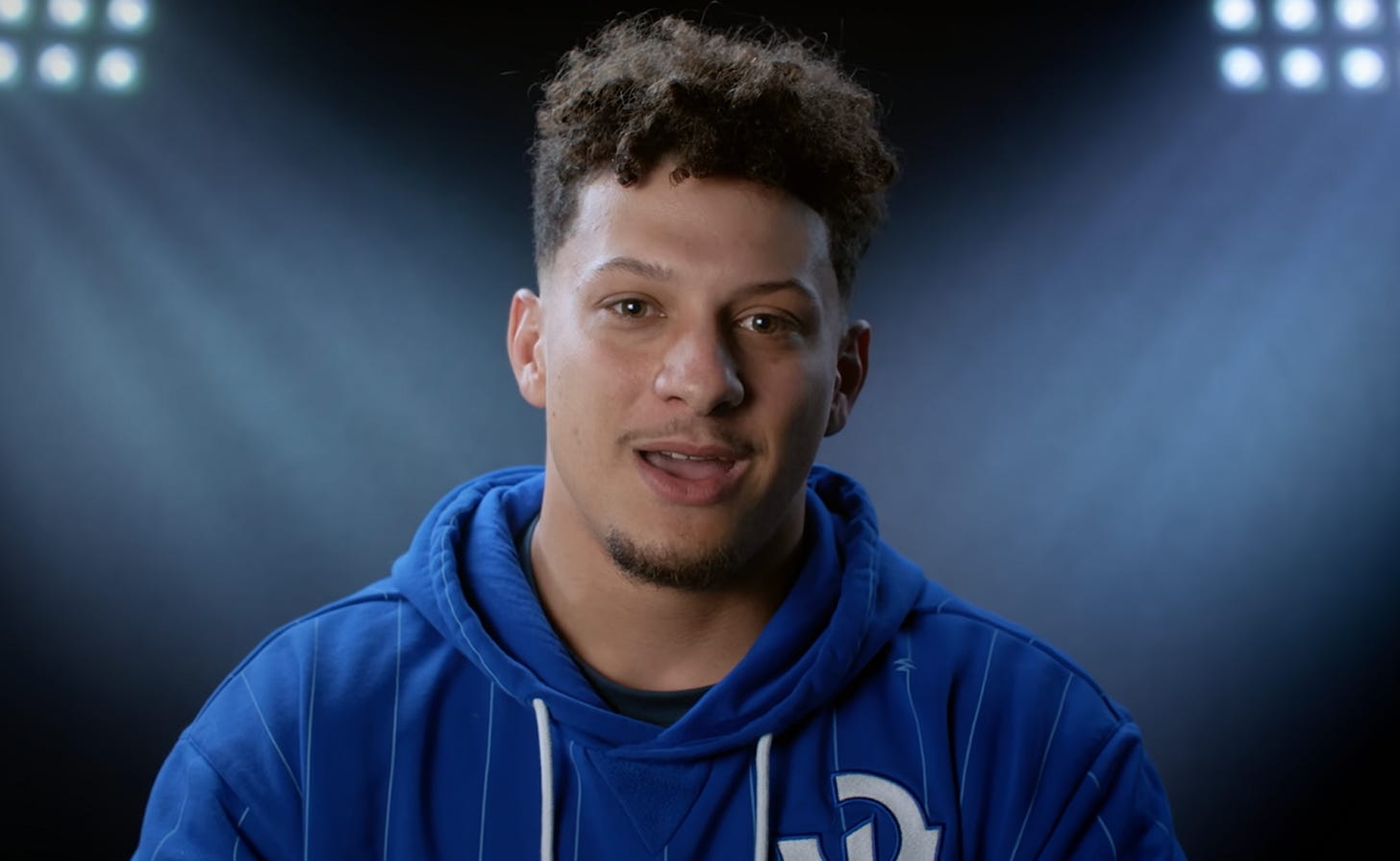
It’s all quiet on the offseason front. Free agent DeAndre Hopkins is on pace to sign with a team by the time Florida goes the way of the Titanic. The Jets have been chosen to be documented for HBO’s Hard Knocks, but new content about the NFL season forthcoming is still weeks away. Team social media managers are throwing everything at the wall until something sticks on Threads, to mere tens of likes. It’s almost too quiet.
Wait, I think I hear something. Out in the distance… the intense, drawled yawping of a man. Yes, it’s a cry, from a man who sounds like he has a giant forehead. What are you saying, forehead man?
Peyton Manning’s production company, named for his signature Omaha, has cooked us content fiends some new peak offseason slop. It's called Quarterback, and is the latest in a short yet rapidly growing lineage of sports docuseries by Netflix. Shows like Drive to Survive, an F1 series that is already producing its sixth season, and the Full Swing golf documentary now filming a second edition have secured enough popularity to ensure the streaming platform will keep sports docs coming.
More importantly, they’re cheaper to make than paying actors and writers, who are both on strike as of this writing against the Alliance of Motion Picture and Television Producers (AMPTP), to which Netflix belongs. During the last writers’ strike, just 100 days of work stoppage set television back years as studios recouped their losses by greenlighting reality TV disasters at breakneck speed. We can expect this fate again (we’re also likely to get entirely AI-generated television, which will certainly be some of the worst dogshit you’ve ever seen).
Netflix has recently decimated its content spending, and live events, sporting or non-, are still their white whale. After this current strike, it’s not farfetched to envision a black and red homepage that’s half-Nick and Vanessa Lachey-hosted mutations of Bachelor in Paradise, and half-behind the scenes of the previous year’s top sports moments, as told by the players and athletes. And that little detail is the first key to the success of these docs: the player perspective.
The Netflix sportsdoc model

Golf has strained to hold my interest since my earliest days, despite being raised by a serial golfer. The sport’s presentation contributed greatly to that struggle. Its aesthetics are often dull, the broadcasts are even-keel and hushed, the barrier to entry — both for high-level professional play and a keen understanding of the game’s inner workings — is fortified with padlocks. Full Swing was some of the most compelling sports media I’ve consumed this past year regardless, due to its impressive ability to present the humans behind each stroke of the club.
Each episode follows one or two golfers, and are packed with all context necessary not only to understand the ins and outs of professional golf, but grasp the emotional gravity of a Tony Finau win at the Rocket Mortgage Classic with whole family in tow, or the weight of Brooks Koepka’s controversial move to the Saudi-funded LIV tour after a disappointing slump. This Golf.com article asks, Did Tony Finau win the Netflix series? No, all of golf did for creating a vehicle to funnel new fans in through gripping storylines.
Which leads to the second key: teaching the game to newbies.
The docs preceding Quarterback excel at this. Formula racing, and even tennis and golf to a lesser extent, are relatively niche on this side of the pond. The average Netflix viewer may know that the lowest score wins in golf, but not much past that. However, the variety of reporters and tour golfers Full Swing filmed for interviews fill in all the possible knowledge gaps without sinking the entertainment factor that the storylines — the players — provide.
With Quarterback, though, this key is absent. Part of this may be that Box to Box Films, the production company hired out by F1 and the PGA Tour for Drive and Full Swing, respectively, did not work on the NFL-centered program. Part of it may be that the audience is more likely to understand football and the outsized importance of the quarterback. There’s no need for a Manning or a Rich Eisen to dub voiceovers on how to get a first down, so virtually the only talking heads are the subjects themselves, their wives and their head coaches. We also get a look outside of the practice facility, to which shows like Hard Knocks or Prime Video’s All or Nothing are largely confined.
Patrick Mahomes might be psychotic
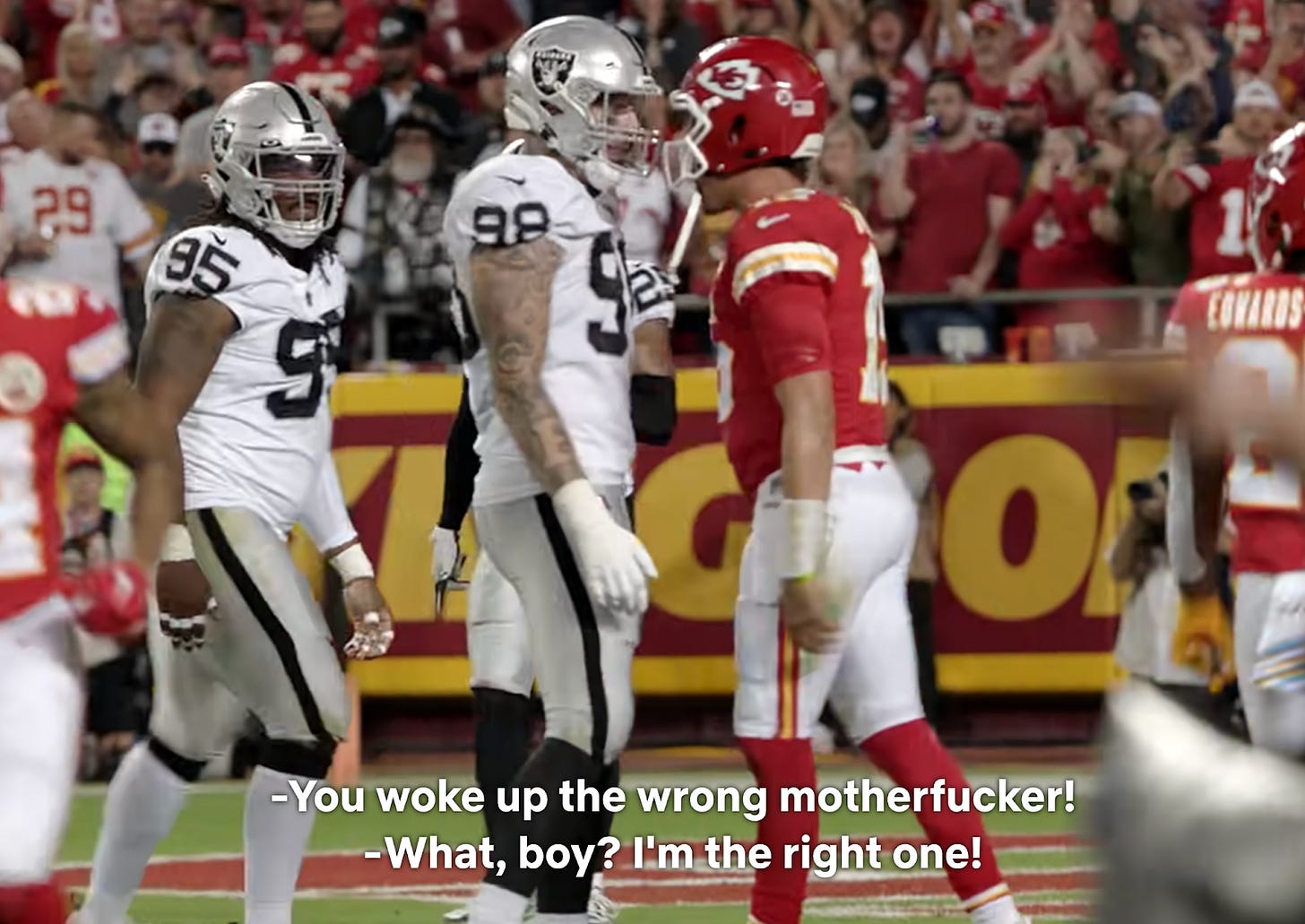
Despite a lack of focus on explaining the game and the nuances of the NFL season, Quarterback still aims for an appeal to the casual fan. If you’re a sicko, like me, there’s little to glean from Patrick Mahomes interviews throughout the eight-episode run. Like other sports superstars well above the stratosphere, his public image is carefully curated, whether or not his widely-disliked brother and wife care to oblige him on that and stay out of trouble.
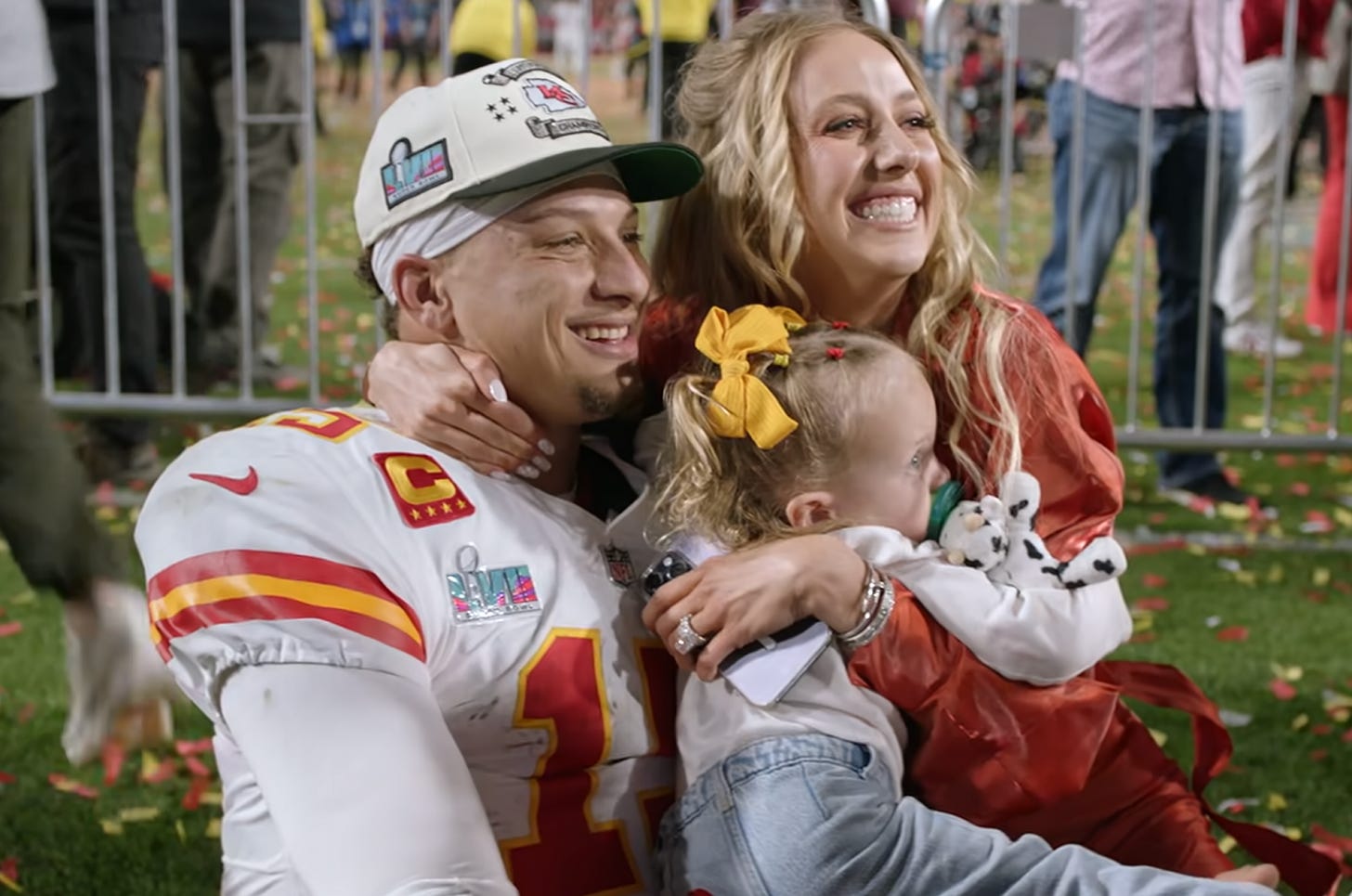
The one standout fact that I’m surprised isn’t getting much attention yet is Mahomes telling Jalen Hurts at Super Bowl media day that he reserved an AirBnB for his family in Arizona for the championship weekend three months prior. Motherfucker got lodging for the Super Bowl before he even won his division. Babe Ruth calling his shot-type shit, have to respect it.
He’s also got a mouthful for everyone who shares a field with him, evidently.
Travis Kelce has started to preach the gospel of Pat Mahomes Shit-Talking on recent installments of his New Heights podcast, and this show backs that up the way Mahomes backs up his talk with stellar passes. Raiders DE Maxx Crosby jaws with no. 15 throughout both matchups between the division rivals, setting Mahomes’ hair on fire after getting away with late hits and extracurricular shoving. “You woke up the wrong motherfucker!” was repeated more times than Funk Flex ran back Otis on the radio when it dropped.
There was little screen time for Mahomes and company in the early goings of the show. He more than makes up for it toward the end, since his season was far longer than the other two participants — Kirk Cousins of the Minnesota Vikings, and Marcus Mariota in his singular year with the Atlanta Falcons. That lineup is questionable on its face. You’ve got the best player alive, sure, but then a mid-tier midwest-dad-core gold chain enthusiast associated with aversions to bright lights; and someone still angling for a chance to win meaningful games nearly a decade after being drafted second overall. The pair of them have four combined playoff wins. Pat Mahomes won three this year alone. He’d won four before he was 25 years old.
Kirk Cousins wants his swan song — and he knows he has little time
Quarterback had an interesting opportunity to provide an insight into these three men’s personal lives in a way that just doesn’t happen that often in NFL-sanctioned media. Maybe less so for Mahomes, whose spotlight never flickers, but quarterbacks’ engagements with media frequently manifest in the form of cliche and stoicism. Such is the life of a professional athlete whose every decision is scrutinized by reporters. With Cousins in particular, the show mined a vein of personality, introspection and a man who has come to terms with the twilight of his football life that pleasantly surprised me.
You can read the fear of mortality on Cousins without him speaking it aloud. He’s got an affection for abnormal training and recovery solutions, like mapping his brain and tracking his focus on visual stimuli. The doc also shows this lovely scene to the Internet:
We’re blessed with footage of Kirk getting finger-blasted by chiropractors as he remembers the career longevity of former Washington teammate Santana Moss. Kirk has a clear reverence for the wideout that notched 14 productive seasons under his belt, Tom Brady and other football elders. He clearly channels this reverence into cognitive training to chase their legacies, all while playing every snap of the season through some gnarly rib pain.
He’s also trying to reverse his decision-making follies. “Right now, in our new system, there have been moments where my instincts have not been trained yet quite where I want ‘em,” Kirk candidly revealed in episode 4, “Mind Games.” He explains his struggle with keeping cool when his gut clashes with the style of new head coach Kevin O’Connell.
Do Vikings fans even appreciate this? Or does having an acutely self-aware quarterback mean nothing if his instincts still lose you a playoff game when he throws to a well-short tight end on fourth down, instead of the greatest receiver in the game downfield in double coverage? Maybe they could respect this desire to grow from Cousins more, were he not already 34 years old. His arm is underrated, and Justin Jefferson benefits greatly from his accuracy, but the prime of Kirk Cousins’ career should already include the mental sharpness for which he still yearns.
Either way, it was fascinating to see him be so open throughout, and Kirko Chainz earned some goodwill from this author. One of the final scenes has us return to a previously-revealed ‘secret’ room in the Cousins home. Kirk keeps all of his football memorabilia and keepsakes behind a murphy door, not one to boast through living room accoutrements. From Pro Bowl jerseys to the Mike Singletary award given by the namesake, who actually coached him in youth flag football, one shelf remains empty: the slot for the Lombardi Trophy his house contractor installed.
His stare at the missing hardware invokes a prior scene of emotion in the final episode, where he’s presented a different award, the Bart Starr Award, given for oustanding character and integrity at the Super Bowl Breakfast annually.
“[Bart] understood, just as I do today,” Kirk says, choking up, “football will one day end.” Time runs out to fill the shelf.
Marcus Mariota doesn’t belong in Atlanta… or in Quarterback
An issue with Quarterback makes itself glaringly known just past the halfway point. As we cut back and forth between Mahomes securing the AFC one-seed (with no mention of the canceled Damar Hamlin game that clinched it for him) and Cousins leading the largest comeback in NFL history, it suddenly dawns on the viewer that Marcus Mariota’s story has fallen away entirely.
It’s not even really the fault of the production; Mariota was benched late-season and didn’t really stick around to keep the bench warm. His daughter’s birth coincided with his demotion, and took the changeup as de facto paternity leave:
“When she was born, Art[hur Smith] brought me in… the following day. It was, like, talking about the future and kind of what he wanted to do, and they told me that they were going to play Des[mond Ridder] for the last four games.”
He also got surgery done on a chronically-bum knee, but Smith implies he didn’t know Mariota was planning that. “When he and I had that conversation, that’s not what we talked about,” the Falcons head coach said in his Belichick-with-polyps affect. I heard little of the Mariota drama in-season, but Quarterback interlaces plenty of pundit comments on his ‘quitting’ on the Falcons, putting them and contemporary articles with anonymous agent quotes to shame. I think getting Marcus’ side of the story, and a reassurance from Smith that there is no bad blood despite the miscommunication, was a nice bow on his appearance in the show, abridged as it was.

But if I’m being real, his inclusion in Quarterback at all was a miscalculation. I completely get what the goal was: show three different tiers of QB, from the eventual league and SB MVP to a guy who just can’t catch a break. The problem is, the lack of break-catching cut his story way too short, five games shorter than Cousins’ and seven shorter than Mahomes’. This is a problem that may find no solution, since most quarterbacks are trying to balance their current amount of public prying and exposure.
Quarterback bites a lot of the Hard Knocks beats while lacking the privilege of just showing up without the consent of the team, as they will when they descend upon the New York Jets facility in the coming weeks. I actually don’t think that Aaron Rodgers will make for appointment viewing, contrary to the consensus, but I cannot wait for his follow-up chats on Pat McAfee to bitch and moan about how he’s getting a bad edit.
I’ll wrap up with a wishlist for the inevitable second season of Quarterback: Lamar Jackson because I think he’ll have a bounceback year, Justin Herbert because cameras make him exceptionally awkward, and Deshaun Watson on the condition that the crew throws tomatoes and garbage at him all day for a year. And spits at his feet. Sam Howell as a first-year starter might be intriguing, too, and a deeper look into how Tua Tagovailoa has handled his rocky Dolphins beginnings, from his perspective, would send Tuanon into anaphylactic shock (hopefully). And lastly, the twist: the 49ers, and follow the whole quarterback room. The chaos is yours to sow, Peyton.




